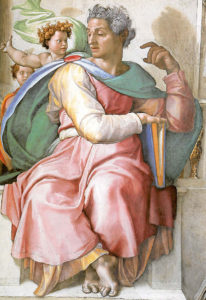Thoughts on Sunday’s Lessons for Aug. 11, 2019
First Reading (Track One): Isaiah 1:1, 10-20
In recent weeks we have heard from the Prophets Amos and Hosea, who prophesied to the Northern Kingdom of Israel as it fell to the Assyrians. Now our Track One first readings come to perhaps the greatest of all the prophets – Isaiah – who prophesied to the Southern Kingdom, Judah, a generation later as it fell under threat from the Babylonians.

The Prophet Isaiah (1508-1512), fresco by Michelangelo Buonarroti (1475-1564) in the Sistine Chapel in the Vatican. (Click image to enlarge.)
Isaiah’s message is consistent with the earlier prophets in its anger – it likens the people to Sodom and Gomorrah – and in its lament: The chosen people are going to lose the promised land and the temple. They will be forced into exile because they have failed to keep the covenant that Moses made with God: to “do good; seek justice, rescue the oppressed, defend the orphan, and plead for the widow.”
First Reading (Track Two): Genesis 15:1-6
In recent weeks our Track Two first readings have looked into the life and work of Abraham, the patriarch of the chosen people: God promising that Abraham and Sarah would have a son; Abraham bargaining with God over Sodom and Gomorrah’s fate. Now we turn back to an earlier chapter, where we find Abram – God has not yet changed his name to Abraham – who is clearly frustrated that he and his wife, Sarai, are still waiting fruitlessly for the heir that God has repeatedly promised them. Abram has followed God’s call and done battle for the people, but his only heir is a slave’s child. He asks for God’s reassurance, and God responds with the repeated promise that Abram’s descendants will be as numerous as the stars.
Psalm: (Track One): Psalm 50:1-8, 22-23
Today’s Psalm fits right in with Isaiah’s prophecy to Judah, and expands upon it: God is pleased to have our offerings of thanksgiving, but God expects us to keep our covenant to be faithful, to be thankful and to practice righteousness and justice to others in our lives. Insincere thanksgiving won’t do, the Psalmist warns. Those who keep God’s way and remember the covenant with Moses will know salvation. But those who forget God risk being “torn apart.”
Psalm: (Track Two): Psalm 33:12-22
Imagine how Abram must have felt after receiving God’s reassurance. Relief, joy and gratitude for God’s love and care: These are the themes, too, of psalms like this one, psalms of thanksgiving and praise. As the prophets consistently proclaim, the nations and people whom God chooses will be happy; God’s eye remains on those who wait for the Lord. Those who trust in the Lord’s name will know God’s loving-kindness.
Second Reading: Hebrews 11:1-3, 8-16
As we begin a four-week lectionary visit with the letter to the Hebrews, let’s take care to keep it in historical context. It is not a pastoral letter of Paul but a later document aimed at a broad audience. Hebrews seems to be aimed directly at Jewish Christians who were abandoning Christianity to avoid Roman persecution of the Christian movement. Accordingly, it can be easy to misread its arguments as justification for anti-Judaism. Christianity remains the better way, the author says, arguing that the Jewish patriarchs were faithful long before God revealed the promise of Christ. They saw the promise of Christ from a distance: “the assurance of things hoped for, the conviction of things not seen.”
Gospel: Luke 12:32-40
Do not be afraid, Jesus assures his little flock. This gentle reassurance comes just after he has reminded them to live like the lilies of the field, striving only for God’s kingdom and knowing that all the rest will be given as well. Still, the next few lines might have made the disciples at least a little nervous: Sell your possessions. Give alms. Make durable purses: Be ready to go as soon as Jesus calls, dressed for action and your lamps lit. Be on guard, for you don’t know when a thief might come into the house at night. Be ready, Jesus warns, for God’s kingdom may come when we least expect it, bringing us “unfailing treasure in heaven, where no thief comes near and no moth destroys.”
What are “Track 1” and “Track 2”?
During the long green season after Pentecost, there are two tracks (or strands) each week for Old Testament readings. Within each track, there is a Psalm chosen to accompany the particular lesson.
The Revised Common Lectionary allows us to make use of either of these tracks, but once a track has been selected, it should be followed through to the end of the Pentecost season, rather than jumping back and forth between the two strands.
For more information from LectionaryPage.net, click here.
